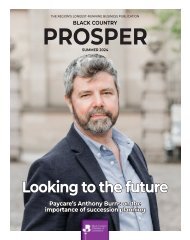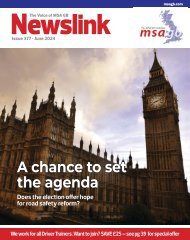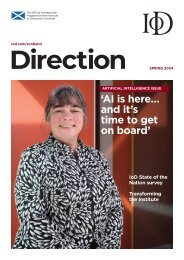IoD Midlands Spring
Institute of Directors, business magazine, director development, business news
Institute of Directors, business magazine, director development, business news
Create successful ePaper yourself
Turn your PDF publications into a flip-book with our unique Google optimized e-Paper software.
Keep up to date at www.iod.com/westmids and at www.iod.com/east-midlands<br />
Welcome<br />
Covid has been wake-up call to<br />
look after the things that matter<br />
Gary Headland<br />
Chair, <strong>IoD</strong> East <strong>Midlands</strong><br />
I hope you are all safe, and well.<br />
My introduction for this issue of our <strong>IoD</strong><br />
regional magazine focuses on two<br />
important issues which are high priorities<br />
for me in my own business, both of which<br />
relate to safety.<br />
Our People<br />
First is the safety of our people: I am<br />
really concerned about the impact the<br />
past 12-18 months has had on them.<br />
My primary role is a people business.<br />
With around 1,200 staff, we deliver<br />
education to approximately 18,000 students<br />
each year, based in three countries on three<br />
continents. Combined, that is a lot of<br />
people, all of whom have felt the impact of<br />
Covid (and to a lesser extent, Brexit) in a<br />
range of different ways. Our operating<br />
model has been turned upside down and<br />
while aspects of our culture have<br />
strengthened during the crisis, many of<br />
our customs and working practices,<br />
systems and routines have effectively<br />
become void.<br />
My concern about people relates to<br />
assumptions I hear being made across<br />
many businesses about what ‘the right<br />
thing to do is’, with very bold statements<br />
about what people want or how people<br />
have fared: “People are happier working<br />
from home”; “people are more productive<br />
working remotely”. With some fairly<br />
gentle scratching of the surface, many (but<br />
by no means all) people really mean when<br />
they ask what the right thing to do is, is<br />
‘what the business needs’ – ie, a financially<br />
driven decision – but they are rationalising<br />
their thinking as a result of a data bias,<br />
more on which below.<br />
The current financial year for my own<br />
business has been very hard but I am<br />
resisting the urge to make urgent<br />
operational decisions that involve people<br />
until we have a better understanding<br />
about the genuine impact the past 12-18<br />
months has had on the health, wellbeing<br />
and productivity of our workforce.<br />
As a young military officer in the early<br />
‘90s, the OODA loop (Source: USAF Col<br />
John Boyd; see above) formed part of my<br />
leadership training and it has stayed with<br />
me throughout my professional working<br />
life.<br />
In my experience, crisis management<br />
can sometimes cause us to take shortcuts.<br />
This can mean that we observe and then<br />
use our knowledge, experience and<br />
intuition to decide without proper<br />
orientation (analysis). Those preferring a<br />
dynamic, seat-of-their-pants approach<br />
might think we can’t afford ‘paralysis by<br />
analysis’: we need to make decisions now.<br />
To a point I agree but equally I have<br />
never felt that expediency is an excuse for<br />
poor judgement.<br />
The danger with our knowledge,<br />
experience and intuition is the risk of data<br />
biases: eg, confirmation bias, framing bias,<br />
over-confidence bias, availability bias and<br />
short-termism.<br />
Human beings are not predictable in<br />
the way that machines and systems are.<br />
In the rush to make decisions, I feel<br />
strongly that we as company directors<br />
need to make the OODA loop work as fast<br />
as possible, not to move rashly from<br />
‘observe’ to ‘decide’.<br />
Our Information and Systems<br />
My second concern is the safety of our<br />
information and systems.<br />
Unfortunately, I have first-hand<br />
experience of a major cyber attack in the<br />
past six months. The attack was made<br />
with military precision in terms of<br />
reconnaissance, intelligence and<br />
execution. The disruption was immense<br />
and cost of recovery significant, despite<br />
having excellent insurance in place.<br />
These despicable attackers are highly<br />
organised and capable and could not give<br />
a fig about our worthy purpose and civic<br />
contribution. Many other education<br />
establishments and businesses have been<br />
attacked very recently. It is on the rise!<br />
We felt that we were well prepared, we<br />
had a cyber security mindset,<br />
accreditation, as well as two recent audit<br />
inspections providing a clean bill of health<br />
– yet even so, we were a victim.<br />
Our attack took place close to midnight<br />
“The attack was made with military<br />
precision in terms of<br />
reconnaisance, intelligence and<br />
execution... the disruption was<br />
immense and costly...”<br />
04<br />
www.iod.com/emidlandsevents

















